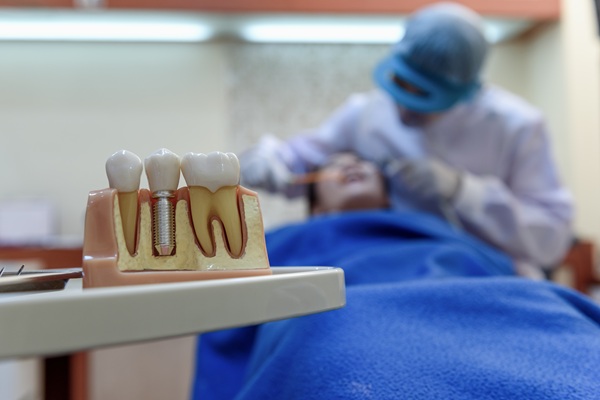Dental Implant Recovery: What to Expect After the Procedure

Preparing for dental implant recovery is just as important as getting ready for the dental implants themselves. A good recovery sets the stage for successful implants that can last the rest of your life, with few additional changes or fixes. Here is what to expect after a dental implant procedure so you can adjust your schedule accordingly and your implants can heal well.
Recovering from dental implants
The process of installing a dental implant requires a dentist to make an incision into the gums and drill a small hole into the jawbone, where a metal post is screwed into the gap in the bone. After this, the dentist will suture the gums closed, and the patient must wait for the post to fuse with the bone tissue.
The first few hours
Since dental implants require the dentist to cut into the gums, they will use one or more pain management methods to ensure that the patient is comfortable. After the procedure, the patient can expect this pain relief to gradually fade within a few hours, so it is helpful to begin taking the pain medication that the dentist recommends, either over the counter or by prescription, before the discomfort emerges to keep it well controlled.
The site may bleed and swell, which is normal. Try not to poke the incision site with fingers or the tongue. The stitches will heal best when undisturbed.
The first day
Within the first 24 hours, the body is allocating much of its energy to healing, so patients will likely feel tired. If the site has continued to bleed slightly, individuals may also feel slightly nauseated. Stick to soft or liquid foods, but try not to suck (such as through straws or on candy) because the suction can pull on the stitches.
It is best to rest during this time. Reduce physical exertion, as blood pressure or heart rate increases may cause discomfort at the incision site. To reduce swelling, sleep at a slight incline so blood drains away from the implant location.
The first week
The swelling is typically at its worst on the second and third days. After this point, people quickly begin to feel like themselves again. Manage swelling by gently applying a wrapped ice pack to the area (on the external side of the face, not in the mouth), holding it to the site for 15 minutes, and then taking a break for 15 minutes.
Gentle salt water rinses can help ease any remaining discomfort, and patients should not hesitate to contact the dentist to ask questions. In fact, many offices will call to check up on patients in the first few days after implant placement. They may request that patients return to the office soon after the procedure to check on healing.
When to seek help
Most dental implants succeed without issue. However, excessive bleeding that does not stop or the presence of a fever should warrant a return visit to the dentist. If patients experience a foul taste that does not go away or if their condition gets worse over time instead of better, it is best to tell the dentist so they can check for infection. Patients should feel increasingly better every day post-procedure.
Make recovery seamless
A dental implant can permanently replace a missing tooth and equip your mouth with a functional restoration that restores your ability to eat and speak confidently. Speak to our office to explore dental implants or ask questions about what a normal recovery looks like after the procedure.
Request an appointment here: https://www.palisades-endo.com or call Palisades Endodontics and Dental Implant Center at (201) 877-1190 for an appointment in our Fort Lee office.
Check out what others are saying about our dental services on Yelp: Dental Implants in Fort Lee, NJ.
Related Posts
Dental implants have become widely popular as a natural-looking tooth replacement solution. Not only do implants restore a patient’s full smile, but they also keep the jawbone engaged to prevent it from shrinking. However, they must be surgically implanted, which can bring some risks. Dive deeper into the pros and cons of dental implants to…
Dental implants offer a long-term solution for people missing one tooth or multiple teeth. This tooth replacement option can restore the function and appearance of your smile. While dental implants are an effective treatment option for many patients, there are several important factors to consider before undergoing this procedure. Here is what you should know…
Wondering about dental implants? Read on to learn more. If you have experienced tooth loss and are exploring potential replacement options, then you have probably heard about dental implants. Dentists and patients are turning to tooth implants because it is provenly effective for replacing missing teeth. However, there are different implants, each of which is…
Dental implants are a popular tooth replacement option among dental professionals. They offer an array of benefits that other tooth replacement options do not, which is why they are often considered state-of-the-art. However, not everyone is a candidate for dental implants, and dental bridges or dentures are a better fit for some patients. Patients should…
